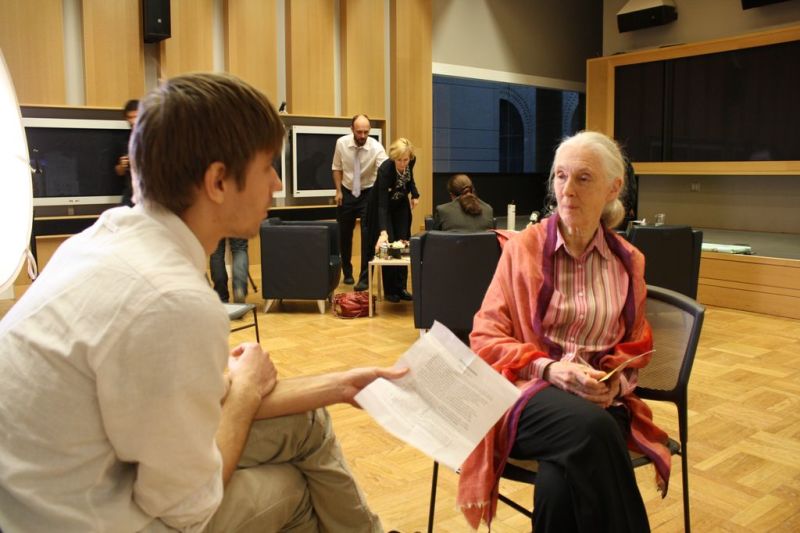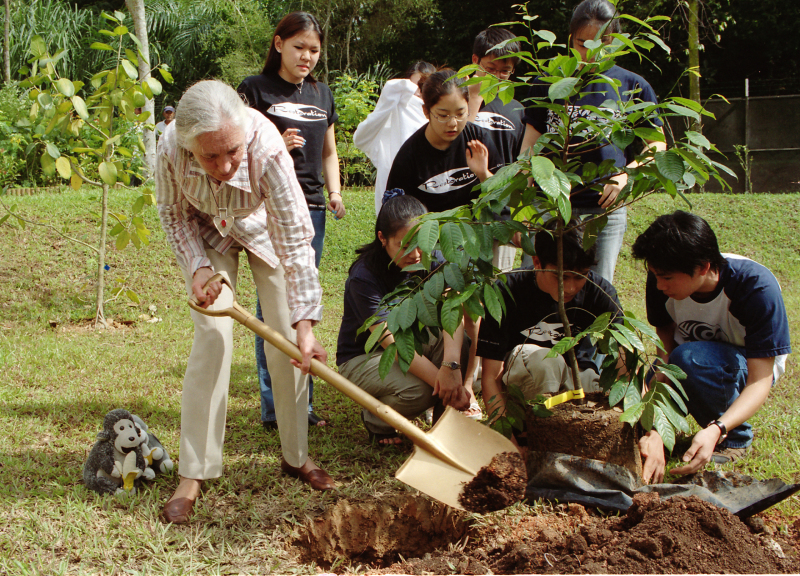“When everybody laughed at me for wanting to go to Africa and live with animals, my mother always said, ‘If you really want something and never give up you’ll always find a way.’”
Every time Jane Goodall delivers a speech she always begins with a chimpanzee greeting. Regardless of her audience – it could be world leaders or young budding environmentalists – the call bellows out.
Each time, the crowd is reminded that chimps are voiceless and unless we speak for them, no one will. It makes sense that Jane Goodall would feel entitled to speak on behalf of the chimpanzees. She’s devoted the majority of her life to studying and protecting them.
In case you’re a bit rusty on the Goodall journey. Here’s a brief recap:
• Goodall was born in London, England, in 1934.
• In 1957, at age 23, she travels to Kenya after a long brewing passion for the continent and its wildlife.
• In Kenya, a chance meeting with Louis Leakey opens up an opportunity to research chimpanzees in Tanzania.
• In 1960, Goodall and her mother board a ship and sail to Tanzania to begin research.
• 52 years later, Goodall has fundamentally changed our understanding of chimps: she discovers numerous human similarities, uncovers their use of tools, and witnesses their dark, violent nature.
• Along the way, she obtains her Ph.D from Cambridge (becoming only the 8th person to achieve this without any previous post-secondary education), writes a slew of books, and wins a load of awards.
• In 1997, Goodall launches the “Jane Goodall Institute” to work towards improved research, education, and conservation of wildlife. The Institute focuses on its Roots and Shoots program for inspiring future generations of conservationists and environmental activists.

At 78, Jane Goodall understandably no longer lives in the wild studying chimpanzees. This, however, is no indication of her slowing down. These days, Goodall spends upwards of 300 days a year traveling and speaking around the world. This unbelievable drive is precisely the reason I saw Jane Goodall speak twice in the span of several weeks.
First, I witnessed her launch a new organic coffee line – “The Jane Goodall Institue Blend” – at Loblaws in Toronto. Two weeks later, at the Royal Ontario Museum, I again watched Jane Goodall impart her wisdom on a captivated crowd. Both times it was evident where her strength lies: stories.
Goodall is a masterful orator and possesses the ability to move any audience. It doesn’t hurt that she has a plethora of incredible tales to tell. When she speaks she uses no notes, has no prompts, and barely breaks eye contact with the audience. Thus, her words come off as genuine and warm. Goodall and her research are essentially one and the same, permanently intertwined within.
Jane Goodall, of course, is not without her critics. Books and academic papers have been written to counter her research. Even The Simpsons, and Gary Larson’s The Far Side have taken playful jabs. Despite her adversaries, Goodall is relentless in her mission and welcomes dialogue with anyone who will listen.
There is much I WANNA KNOW from such a remarkable and passionate person. I met up with Dr. Jane Goodall at the ROM several hours before her talk.
From her new coffee line, to the state of African wildlife, to her faith in future generations to solve the world’s problems, we cover it all.
. . .
There is a lot of talk these days about Africa’s economic boom. Do you sense that this development will negatively impact wildlife?
Oh, it definitely will and is, and also it’s widening the gap between the successful business people and the people who have nothing. The poverty is increasing.
Have you seen any signs of this or heard any stories?
There are so many stories. For example, the last one I heard was in Malawi where people are moving further and further into lion country and the lions are getting more used to people. There have been a couple of cases where lions have killed people, so now lions are automatically shot.
Where people are moving into chimpanzee forests and cutting down the trees, the same thing is happening. Chimpanzees are moving into the villages and being killed. So, it’s happening everywhere.
You just launched a coffee line exclusively at Loblaws. This is your attempt to bridge that gap between human needs and wildlife needs. How can a coffee from Jane Goodall do that?
Well, it’s a lovely story actually. It became very obvious to me when I flew over the whole area of the Gombe National Park that the people were struggling to survive. There were more of them than the land could support; all of the trees had gone. It was a desolate scene.
How could we even begin to protect the chimps in this little oasis of fertile soil? So, we started this take care program, very holistic, improving the lives of people with food, reforestation, and water sheds. But, they chose. It was listening to them and what they wanted and we tried to fulfill those needs to start with.
And, then we found there was really good coffee in the slopes around Gombe but the farmers couldn’t get it to market very well. We persuaded coffee roasters to come over and they said it’s fabulous coffee. Now, the farmers get a higher price, they get assistance with learning how to use one area to produce two or three, or even four, times the yield. They’ve all got management plans for the village. They can’t suddenly take over all the land for coffee. That’s not allowed. Of course, it’s shade-grown coffee; that’s what everyone wants. This is good for the soil, plus they can’t really afford fertilizers anyway. The trees are coming back and the particular coffee in Canada that you get sends two dollars to our Africa program that is dealing with children’s education and so forth. This particular program has one aspect of it where the shade grown coffee isn’t habituated or burned so that every place you used to crow coffee the village puts aside that much land of forest untouched.
Your decision to partner with Loblaws seemed a bit odd at first. Many believe supermarkets are responsible for our unhealthy food system. Do you see this as your way to work within the system to change the system?
Yes, because if you don’t work with people it will never change. After all, the amount of space given to organic food has hugely increased and that’s because people demand it. So, it’s a mixture of educating the public and helping them understand that yes it might cost a bit more but then you’ll waste less and you’ll treat it with more respect. We don’t value our food enough, or clothing, and don’t think about how it got there and things like that. At the same time, the store is gradually realizing what people want and they change the way they are marketing things and buy more of what people want. It’s all integrated like everything else on this planet.
Several African economies are dependent on wildlife tourism (Rwanda, Kenya, etc.). Where do you draw the line between this being a beneficial practice and one that negatively impacts the lives of these animals?
It very often hurts the environment. In the Ngorongoro crater, for example, it’s not as it used to be at all. So, you have to find this balance, and of course for a government that’s always trying to make more money, and for local people who are trying to profit, if eight people going to see the gorilla’s makes this much money then it leads to “Let’s bring 16.” That’s the danger. It has to be very strict with awareness and education amongst the Africans, not the white people going in and saying we’re going to stop the local people from making money from tourism. It’s got to start within Africa. That’s why our “Roots and Shoots” program is so important.
When you went to Tanzania in 1960 Africa was referred to as the “dark continent.” When you travel in 2012 do you sense that people are better educated now?
I think it’s totally changed. When I went it was full of mystery and we didn’t know much about it. When I first went out there, there were animals everywhere. It wasn’t just the national parks. I landed in Nairobi and driving up to the white highlands there were animals on the road, there were aardvarks. The first night I was there I was told in the morning, “Come see a big leopard.” There was also still the signs of apartheid and that’s something that has changed that was horrible. It was dark in so many ways: the slave trade and apartheid were linked. So, we now know so much more.
I still hear a lot of people referring to Africa as a county. When you hear that does it annoy you?
I always say Africa is many countries and the attitude to wildlife differs from country to country. It is not one country. It’s like South America or Europe.
A large part of your success is due to your unwavering determination. Do you credit that quality as the recipe for your accomplishments?
It was having an amazing mother, so that when everybody laughed at me for wanting to go to Africa and live with animals, my mother always said, “If you really want something and never give up you’ll always find a way.” When I finally got there – and Louis Leakey offered me this incredible opportunity to study chimpanzees – I was a young girl with no degree, straight from England, and they wouldn’t allow me to be alone. So who do you think volunteered to come with me? It was that amazing mother. So, it was in the family. It wasn’t just my mother. The whole family was supportive and helped me to make me who I am.
Dr. Jane Goodall and Roots & Shoots members plant trees at the Shanghai Zoo in China.
You place a lot of faith and hope in future generations to protect the environment. What makes you so hopeful that they will not make the same mistakes?
I think we’ve made so many mistakes and so many young people see that and are completely horrified. There’s also so much more information available now. The Roots and Shoots program became so important to me because I met so many young people who’d lost hope for the future; thoughtful high school students, people working their first jobs, university students. One of the reasons is you feel helpless when you learn the big problems and you do nothing. Roots and Shoots is to give young people hope. They choose their projects, roll up their sleeves, and get out there and they take action. If you take action about a problem you think is important and you see success and then realize young people in 131 countries are doing the same thing that’s much more hopeful.
FOR MORE INFORMATION ON JANE GOODALL:
1) Check out her foundation at www.janegoodall.ca




0 Comments